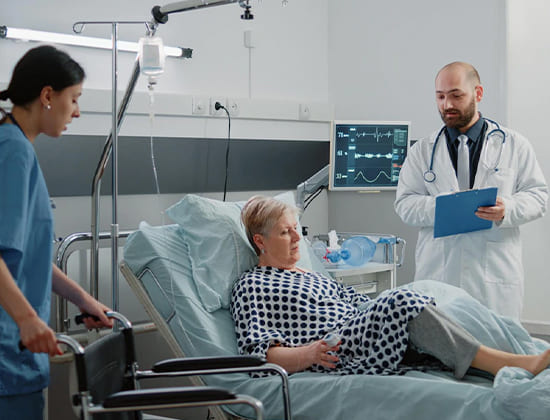IoT Healthcare Solutions
Take your patient-care system to the next level or make organization management a lot more seamless with an advanced range of IoT applications tailored to your business needs. With IoT healthcare services, you can create a well-rounded care system driven by automation and real-time data analytics.
Get In Touch With Us
What are the Benefits of IoT in Healthcare?
IoT is helping healthcare organizations to improve the quality of their services, improve organizational operations and enhance the communication structure among key stakeholders. While patients can leverage IoT-based applications and devices to share real-time data with their doctors, physicians can use it to offer better treatments, connect with patients in critical conditions, and more. Besides this, IoT opens a wide pool of opportunities for the healthcare industry wherein organizations can garner important insights from the devices and improve their processes or deliver dynamic business services.
IoT Use Cases in Healthcare
Discover where IoT can fit into Your Healthcare Organization and its Core Processes.
Do You Want to Revolutionize Your Healthcare Services with IoT Applications?
Applications of IoT in Healthcare to Solve Challenges
Address your specific business challenges with the right IoT applications.
Lack of Patient Data for Accurate Treatment
In some circumstances, the patients can share inadequate information with the doctors, rendering them to offer treatment with limited information. For instance, patients may not remember their critical moments from the day when it comes to psychological problems. They tend to respond according to their current mood, which impacts the quality of treatment. Under such circumstances, having data between the last visit and the current one can help physicians know the exact conditions.
- Glucose monitoring systems
- Heart-rate monitoring systems
- Parkinson’s disease monitoring systems
- Depression and mood monitoring

Inability to Offer Emergency Care on Time
Emergency calls for urgent patient care. For instance, if a patient has BP-related problems, immediate ER can save his life. Similarly, if someone has met with an accident on the road with the least traffic, sharing information on time with paramedics can help get the deserved attention. While traditional healthcare systems cannot support these circumstances, advanced IoT-based wearable devices can trigger notifications across emergency contacts and healthcare facilities to attract attention.
- Remote patient monitoring
- Wearable health devices
- Emergency care applications
- Connected inhalers

Diagnostics and Treatment Affordability
At times, healthcare systems fail to diagnose certain conditions like pH imbalance in the body, internal bleeding, etc. These conditions, if left unattended, can be life-threatening or may lead to other severe problems. However, healthcare IoT sensors can be really helpful here. Once swallowed by the patients, these systems transmit the information to the physicians and help them analyze the treatment progress better.
- Ingestible sensors
- Brain swelling sensors
- Smart video pills

Precision and Tracking within Important Care Aspects
Healthcare organizations have no way to ensure the precision of the treatment in case of surgeries. It is a manual process that depends on the expertise of the surgeon. At the same time, tracking this aspect and other things like inventory, staff, patients, etc., is impossible. IoT-based systems can, however, solve this issue with advanced systems using AI, sensors, and more.
- Robot surgeons
- Inventory tracking solutions
- Remote patient monitoring
- Staff monitoring applications
Other IoT Service Industries
Explore our industry-based IoT development services for other realms.
Frequently Asked Questions
1. What is an IoMT?
Internet of Medical Things or IoMT is the network of interconnected medical devices, hardware, software, and corresponding applications that helps medical teams to garner important patient data. With the IoT healthcare system, the healthcare industry can improve the overall care system and automate healthcare processes.
2. What are some IoT devices?
IoT devices include MRI machines, IV pumps, remote patient monitors, smart ventilators, smart contact lenses, smart ingestible sensors, connected inhalers, smart beds, therapeutic lasers, insulin pens, and wearables. These devices can track patients’ important health data and transmit it to doctors.
3. What is the difference between IoT and IoMT?
Internet of Medical Things involves interconnected devices and their applications within the field of the healthcare industry. However, IoT refers to consumer-focused devices that aim at offering maximum convince to the consumers with the added advantage of usability.
4. What is remote patient monitoring used for?
Also known as telehealth, remote patient monitoring allows patients to record their health data on wearable devices. These devices transmit data to the physicians who can offer the right treatment based on the patient’s data. IoT-based healthcare monitoring system allows chronic patients to receive care in times of emergencies and helps remote patients save the cost of traveling to the hospital.
5. How long does it take to build IoT-based Healthcare applications?
The time for custom IoT app development for healthcare depends on multiple aspects like:
- Type of application
- Scale of deployment
- Number of users
- Hardware/ software/ both development
- Team size and their expertise, and more.
For an accurate estimation, you can share your requirements with us.
6. How much does custom IoT healthcare development take?
The level of IoT functionalities is the main factor that impacts the time to build IoT healthcare software. For instance, if you want to develop the device and application from scratch, it’ll take more time than the one where only a software application is developed. At the same time, if the features are more complex in nature, the development will take more time. Accurate estimation is only possible once the IoT healthcare service provider has thoroughly considered all your requirements.
Featured Content to Help You Learn More About Custom Healthcare Solutions
Latest Blogs
What to Expect from Modern Healthcare CRM Software Development Services in 2025
Executive Summary The healthcare sector is experiencing a digital revolution, and customer relationship management technology sits […]
How an AI Chatbot for Mental Health Is Redefining Patient Care and Emotional Support
Mental health care is undergoing a Silent Shift—and at the heart of it lies the transformative power of technology. Today, […]
AI in Health Informatics: The Silent Revolution Powering Smarter Healthcare Decisions
AI in health informatics is reshaping how healthcare organizations manage the growing complexity of clinical data. The explosion of information […]




















